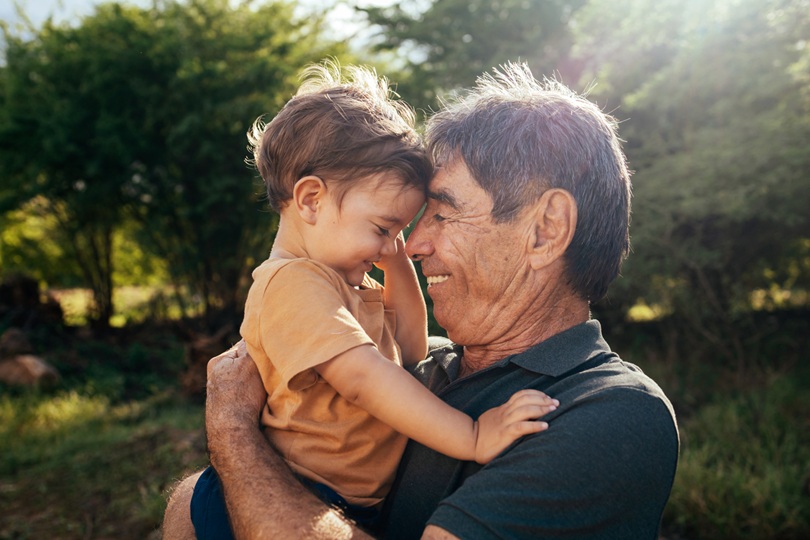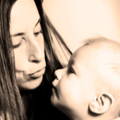Grandchildren Older Than Children? A New Family Phenomenon

Know a family where there are grandchildren older than children?
You’re not alone: Welcome to the modern family tree
First, they become Grandfathers. Then, they become Fathers. Again. My daughter was six when I first heard of this family dynamic: One of her classmates had a grandfather in his mid-sixties, who re-married a woman in her mid-thirties. They went on to have three children—children who were years younger than my daughter and her friend. It took me a minute — or thirty — to do the math. Even then, I wasn’t entirely sure how to figure out this family dynamic. My daughter’s friend was older than her grandfather’s kids, making her the only “aunt” in Grade One.
This isn’t as rare as I once thought. My doctor, a friend in real estate, and a peer I do charity work with are all grandfathers who become dads again in their 60s and 70s. They all boast proudly to me about how life-altering (“in a good way!”) and how “amazing” it is to find themselves as new fathers again, 30 to 40 years after they became parents for the first time and also after their adult children had babies and made them grandfathers.
A month ago, a 67-year-old man friend of mine told me elatedly that his three-year-old grandson is going to be in the same daycare as his own almost two-year-old toddler son, whom he had with his third wife.
Two weeks ago, another 70-year-old acquaintance, who worked in advertising and is retired, boasted to me about his one-year-old daughter and his three grandchildren, who ranged in age from 14 to 20. Technically, his grandchildren are old enough to babysit his infant daughter.
And then last week, another male friend who just turned 72–that I’ve known for years, even attending his wedding–announced in a jokingly-toned email how he’s getting “back in the dad game” thanks to his new(ish) 39-year-old wife, now five months pregnant with twins. He also has four grandchildren, ranging in age from 8 to 17.
In all of these relationships, these babies were planned. One friend’s wife shared how many discussions they had about having children since that was a deal breaker for her (she was closer to 40 than 30). She told me they were thrilled when they got pregnant. But I can also tell you who wasn’t thrilled… My friend’s only adult daughter, who was not included in any discussions about her father having children with his new bride and is also older than her. Should my friend’s adult daughter been included in discussions of her father — the grandfather of her children — and his new much younger wife, having more children? I don’t know. What I do know is that she was and still is, pissed (for lack of a better word). She’s pissed that her father had children when he was already a grandfather. Sadly, her relationship with her father, and by default his relationship with his grandchildren, is fractured and almost non-existent for long periods of time.
However, these “Second-Time-Around” dads—which is how I refer to them—are interestingly or surprisingly eager to share just how thrilled they are that life has given them a second shot at diaper duty.
As their grandchildren, who are sometimes 20 plus years older than their grandfathers-turned-Second-Time-Around dads’ kids might say, “They are owning it!” and “There’s no shame in their game.”
I’ve been told by these mature men who are embracing FATHERHOOD 2.0—making family trees so confusing they need footnotes to explain how everyone is related—that the most common reaction after they explain that they are going to be a dad again (while their grandkids could be old enough to drive their much younger new siblings to playdates) tends to land somewhere between, “Congratulations. I’m so happy for you,” and “Wait..What? How does that work?”
Although more and more grandfathers now double simultaneously as new fathers, I couldn’t find anything of substance anywhere on the Internet about this kind of modern family dynamic or this grandfather-turned-dad phenomenon.
My daughter and I have watched every single episode of the sitcom Modern Family. In 2012, when my daughter was nine, I gave birth to my son that same year with a second baby daddy —Suddenly, that’s not so confusing anymore, is it? — an episode called “Bringing Up Baby” aired. I rewatched it last night. Jay, the patriarch, is turning 65. Gloria, his gorgeous second wife, who is 40, was terrified to tell Jay this news. Turns out, Jay is overjoyed to learn that she is pregnant.
“That’s the greatest news I’ve ever heard,” were Jay’s exact words, which he said in front of his two adult children. Jay’s adult son was only perturbed because he was trying to adopt a second child with his partner. Jay’s adult daughter Claire, the mother of three, was delighted not about having another sibling decades younger but knowing that Gloria would get “fat.” The writers effectively killed the stigma of Second Time Around Dads, at least on-screen. Although, at one point in the episode, Jay did utter, “I might not have time for this new one, and I can’t screw it up.”
But in real life, it’s rarely lighthearted. Adult children often struggle with the idea that their fathers are now having kids that will be younger than their own. And while the idea of a grandfather pushing a stroller instead of a golf cart sounds endearing, it can be disorientating for family members. Suddenly, some grandfathers are babysitting their grandchildren while simultaneously trying to burp their newborn babies. I visited one of my friends. There was a sweet baby room. Across the hallway was her teenage son — from her first marriage— in his room, complaining about the wifi speed, the ultimate generational overlap.
I would like to make it clear that all these couples I know — despite an age difference — genuinely love each other. Or maybe, in spite of an almost 30-year age gap, they genuinely love each other.
These women in their 30s were not looking for a sugar daddy. These men were not necessarily looking for a trophy wife. In all the cases I know, they’ve found a genuine connection. So is it all that surprising that all of these fathers-turned-grandfathers-turned-fathers-again say that having another baby makes them feel young again? Becoming a father again, decades after their first batch of children (even if they know they may not live long enough to see their children graduate university) do really seem genuinely excited about the future, even if that future involves packing a diaper bag instead of a golf bag.
I spoke to a handful of parenting experts who found this topic “fascinating” and raised some valid concerns. They noted that “mature” fathers can bring more patience and stability. They are wiser and bring life experience to the table. Yet, simultaneously, they mention how Second Chance Dads need to realize they are raising children with an entirely new generation of parents who “do” parenting differently. (No, you can no longer leave your baby in the car while you run into the bank machine!)
These days, “mature” men don’t exactly look old. They’re “silver foxes.” They hit the gym. They run marathons. They get Botox. Truthfully, many of them look better and are more fit in their 60s and 70s than they were in their 40s. One Second Chance Father told me how, on the way to attending his baby’s pre-k graduation last year, he stopped to pick up some items, using his senior discount at Shopper’s Drug Mart.
The grandfathers-turned-fathers I spoke with main complaint is having to explain to their grandchildren why their uncles or aunts are younger than them.
“And yet, one cannot deny the weight of time, meaning: What does it mean to start a journey of fatherhood while also moving deeper into old age? How does one hold both of these realities at the same time? How do you heal and move forward simultaneously? At whose cost?” adds Jola Mecani from A to Z Psychotherapy, also a Registered Social Worker and Psychotherapist.
“Of course, these relationships also exist within a broader societal context, where they may be met with raised eyebrows or even outright criticism. People may question the fairness of fathering a child who may grow up with an aging or absent father due to health decline,” says Mecani. “The younger wife may face scrutiny about her motivations, while adult children from the man’s first marriage may struggle with feelings of displacement or resentment. It’s not uncommon for these older fathers to reassure themselves that “this time will be different,” but that doesn’t always erase the tensions that arise between new and existing family members.”
There’s also the challenge of bridging the generational gap…not just between father and child, but between partners, says Mecani. “A woman in her 30s may be in the thick of raising a young child while her husband, at 65 or 70, is contemplating retirement and perhaps even existential-based dilemmas/questions. Their priorities, energy levels, and life perspectives may not always align, and navigating those differences requires intentional effort. Moreover, a crucial consideration is the well-being of the newborn. Healthy attachment in early childhood relies on consistency, attunement, and emotional availability from caregivers.”
While older fathers may bring wisdom and patience, parenting a newborn is physically and emotionally demanding. Mecani reminds us that “the ability to wake up for night feedings, engage in play, and respond to a child’s ever-evolving needs requires both energy and presence.”
Mecani continues, “If an older father is dealing with health issues, fatigue, or a significant generational gap in parenting approaches, this could impact the child’s sense of security and attachment. Children thrive on predictability, and if a parent is less able to provide this due to age-related factors, the burden may fall more heavily on the mother or other caregivers, shaping the child’s early experiences of connection and safety.”
I will admit that all three of the Second Chance Dads and their younger wives that I know are very financially well off. All three couples have full-time help, something Second Chance Dads seem to work into the negotiations of having babies with their younger wives.
Calgarian-based writer, educational consultant, and Parenting Mentor Julie Freedman Smith says, “I can imagine that becoming a parent at an older age has its benefits. There may be less trepidation because it’s not so unknown. There may be a feeling of getting a “do-over,” a chance to do a better job the second time. Dad may have more time to spend with this child as he may not be working as hard or maybe wants to make a strong connection before he gets too old.”
She adds that parenting at an older age has its disadvantages. “Parenting young kids takes a lot of energy, which may be less available for this older dad. There may be worries about not being around for as much of the child’s life. There may also be a variety of relationship challenges involving jealousy with the adult kids and grandkids.”
Jola Mecani from A to Z Psychotherapy adds, “Having children can be both rewarding and deeply challenging at any age. I can imagine that for these men who may already be well in their sixties, settled into grandparenthood, getting to hold their newborn child must feel like a mix of wonder, nostalgia, and perhaps even a little disbelief. They have lived entire lifetimes raised families, and now, just as they might have thought their days of late-night feedings and first steps were behind them, they find themselves back in the role of “Dad” rather than ‘Grandpa.’”
She speaks about the shift in family dynamics and possible trauma. “I often think about how this shift must feel, not just for the father but for the entire family. For his adult children, watching their father start over might stir up complicated emotions: pride, confusion, resentment, or even grief for the relationship they wished they had when they were young. I wonder how it feels for the new mother, too, excited to start a family but also aware that she is parenting with someone at a very different life stage. Will he be able to run after a toddler with ease? Will he be there for the teenage years? These are real, valid questions that can bring both joy and uncertainty into the family dynamic.”
While I’ve seen the jealousy—adult children blindsided by the fact that their fathers are having children in their grandfathering years—I will say these “mature” men don’t seem all that concerned about how much time they will, or will not, have as Second-Chance Dads.
I don’t want to say it—I didn’t say this—but there is also the inheritance factor. The age gap in these families isn’t always just a few years—the difference can be decades. Adult children can have half-siblings who are forty years younger.
To be blunt, the men I spoke to are financially set, retired, or quickly on their way to retiring. Money is not an issue for them, but it is an issue that their adult children do think about. These adult children, who believed they would be the heirs, find themselves thinking about how their father’s assets will be split.
Even worse? (And I didn’t say this…) They do think of splitting their inheritance with their Dad’s new baby..who may still need a baby seat in the car.
Mecani also thinks about the “deeper emotional layers” for this kind of modern family makeup to succeed. “For some older men, this second chance at fatherhood may be about more than simply expanding their family, it may be about healing past wounds or rewriting their own narrative,” she says. “Older fathers who may not have been emotionally available in their first marriages may see this as an opportunity to be present differently, striving to be more present with their new children. I see it as older fathers approaching this as a second chance, a chance to be more emotionally available and to “do things differently” than they did before. Many of these men come from generations where emotional expression was not encouraged, where fathers were providers rather than nurturers. If they were emotionally distant or preoccupied with career or survival during their first experience with parenting, they might now see this new child as an opportunity to be more present and engaged, to “get it right” this time.”
Ultimately, she says she wants to be “hopeful.”
“I believe that if love and commitment are at the heart of any family, these unique circumstances can be wonderful with some much-needed open and honest conversations. Expectations, roles, and emotions need to be acknowledged so that the relationships between partners, children, and even grandchildren can be navigated with care,” she says and adds, “Seeking support outside the family is a must to ensure that everyone’s needs are met and that the infant/new child can also thrive in their new environment. The idea of the idyllic “family” image has stretched and progressed quite beautifully in the past few decades so that we can find space for these partnerships as well.”
This grandfather-turned-dad phenomenon is only going to grow. If anything, Hallmark may want to start now by creating celebratory cards that merge Father’s Day and Grandfather’s Day into one convenient — if not confusing — holiday.















